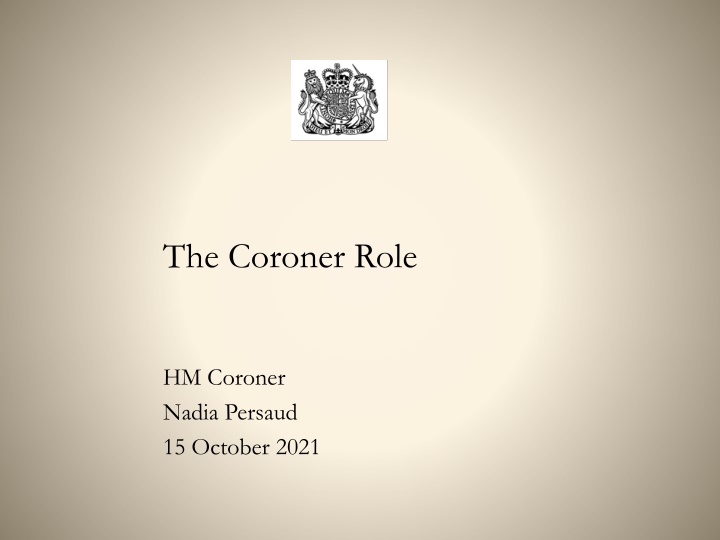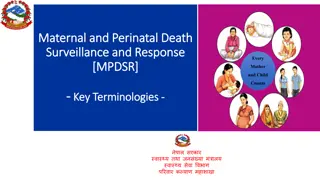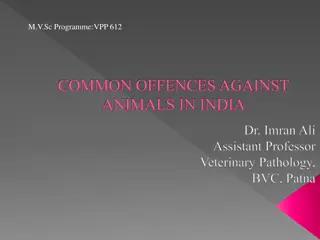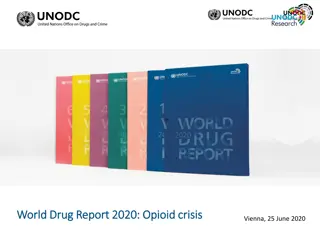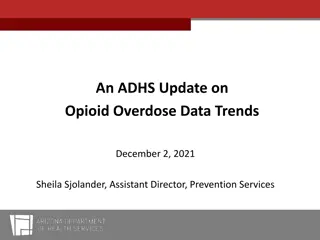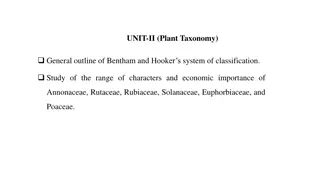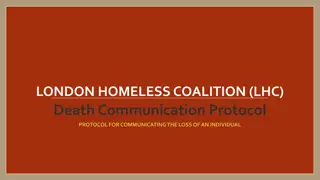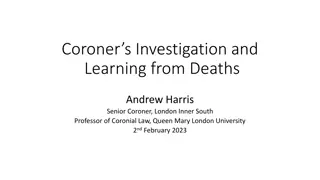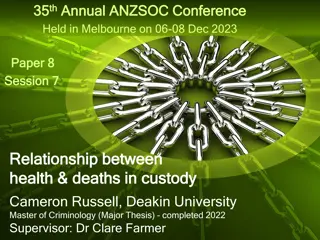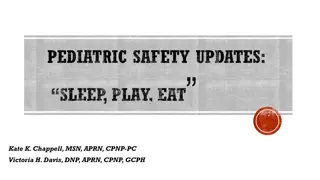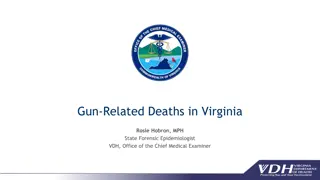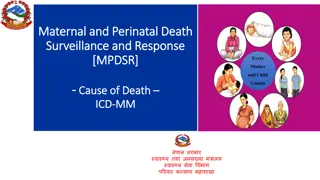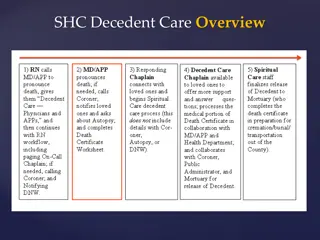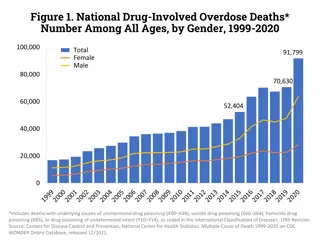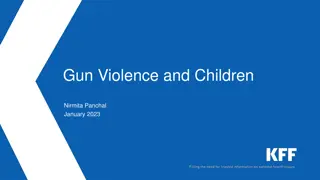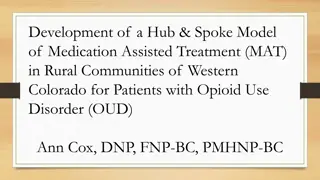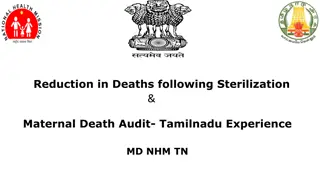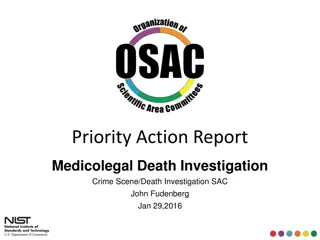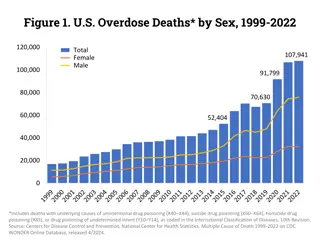The Role of a Coroner in Investigating Unnatural Deaths
The role of a coroner involves investigating deaths under specific circumstances, such as violent or unnatural deaths, unknown causes of death, or deaths in custody. This investigation includes notification, postmortem examinations, and possibly opening an inquest if required criteria are met. The coroner also gathers evidence and liaises with other investigators to establish the cause of death thoroughly.
Download Presentation

Please find below an Image/Link to download the presentation.
The content on the website is provided AS IS for your information and personal use only. It may not be sold, licensed, or shared on other websites without obtaining consent from the author.If you encounter any issues during the download, it is possible that the publisher has removed the file from their server.
You are allowed to download the files provided on this website for personal or commercial use, subject to the condition that they are used lawfully. All files are the property of their respective owners.
The content on the website is provided AS IS for your information and personal use only. It may not be sold, licensed, or shared on other websites without obtaining consent from the author.
E N D
Presentation Transcript
The Coroner Role HM Coroner Nadia Persaud 15 October 2021
Overview Notification of deaths to the coroner Investigatory role of the coroner What is an unnatural death? COVID-19 deaths Opening an inquest
DUTY TO INVESTIGATE Section 1 of the 2009 Act confirms a duty to investigate in the following circumstances: Where the body is lying in the coroner s area and there is reason to suspect: The deceased died a violent or unnatural death, or Cause of death is unknown, or The deceased died in custody or state detention
Notification of deaths Notification of Deaths Regulations 2019 Ministry of Justice Guidance https://assets.publishing.service.gov.uk/government/uploads/system/upl oads/attachment_data/file/878083/revised-guidance-for-registered- medical-practitioners-on-the-notification-of-deaths-regulations.pdf Referrals largely come from doctors (hospital or GP) and police officers Less frequently, referrals come from families or other interested persons Referrals are now largely electronic referrals (model coroner area)
Investigatory role of the coroner The coroner has legal control of the body when a death is reported to them The coroner must be satisfied as to the identity of the deceased Postmortem examination may be required for the cause of death Different forms of postmortem examination Consideration of faith and other family wishes Toxicology and hair analysis DNA and odontology
Investigation or Inquest If the preliminary investigations reveal that the duty to investigate is not triggered, the investigation can be discontinued If there is reason to suspect that any of the criteria in Section 1 apply to the death, then an inquest must be opened
Investigatory role beyond establishing the cause of death Gather evidence such as records; photographs; text messages; notes of intention; CCTV evidence; dash cam recordings Statements from key witnesses Internal organization governance reports Request police overview reports Liaise with other investigators e.g., HSE; HSIB; IOPC
What is an unnatural death? Oxford Dictionary unnatural : Not in accordance with the usual course of nature Medical literature: Death related to an internal bodily event not influenced by external occurrences Beitrage zur gerchtlichen Medizin (1985) 41-47
Unnatural death A death may be unnatural where it has resulted from the effects of a naturally occurring condition or disease process, but where some human error contributed to the death. R Touche v Inner London North Coroner [2001]
Natural or unnatural? 1a Diabetic ketoacidosis II Morbid obesity 1a Lung cancer II Smoker 1a Pneumonia 1b Fall 1c Frailty of old age and osteoporosis 1a Pneumonia II Unwitnessed fall at home 1a Hypoxic ischaemic encephalopathy 1b Aspiration of food 1c Cerebrovascular accident 1a Chronic liver cirrhosis 1a Acute alcohol toxicity
COVID-19 deaths Chief Coroner Guidance notes (Nos 34 to 39) COVID-19 is a prima facie natural cause of death. A doctor can sign a MCCD if there are no factors present that would render the death unnatural The fact that COVID-19 is a notifiable disease under the Health Protection (Notification) Regulations 2010, does not mean that it must be reported to a coroner If there are concerns that failures in the workplace caused a person to contract COVID-19 and they then died from the disease, this can render the death unnatural If there is reason to suspect that some failure in the clinical care to a COVID- 19 patient contributed to death, then the death may be rendered unnatural.
COVID-19 impact on inquests Many inquests now held remotely or partly remotely Positive feedback from families and witnesses to this form of hearing Allows international participation in the inquest hearing Always open hearings the public and the press can attend in person Caused a backlog of jury inquests in many coroner areas
Opening an Inquest Inquest openings are always publicised in advance and take place in court Brief hearing to formally open the proceedings (the laws of contempt will become active from the opening of an inquest) Set directions and identify likely interested persons Set the inquest hearing or pre inquest review date Adjourn for the evidence to be gathered
THANK YOU AND ANY QUESTIONS?
